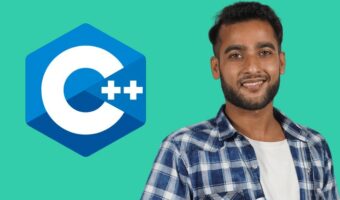Object-Oriented Programming in C++
About This Course
Object-Oriented Programming (OOP) in C++ is a course that focuses on teaching the principles and techniques of object-oriented programming using the C++ programming language. OOP is a powerful paradigm that allows developers to organize code into reusable objects, making software development more modular, maintainable, and efficient.
In this course, you will learn the foundations of OOP and how to apply them in C++. You will start by understanding the core concepts of objects, classes, and encapsulation. You will learn how to define classes, create objects from those classes, and access their member variables and member functions.
Next, you will explore inheritance, a key feature of OOP. You will learn how to create class hierarchies, derive new classes from existing ones, and leverage the benefits of code reuse and specialization. You will also discover polymorphism, which enables you to write flexible and extensible code by allowing objects of different types to be treated as instances of a common base class.
The course will also cover other essential OOP concepts such as abstraction, encapsulation, and object relationships. You will learn how to use access specifiers to control the visibility of class members, implement constructors and destructors, and handle object relationships like composition and aggregation.
Throughout the course, you will work on practical examples and hands-on exercises to reinforce your understanding of OOP principles in C++. By the end, you will have a solid grasp of OOP concepts and be able to apply them effectively in your C++ projects. Whether you are a beginner or have some experience with C++, this course will help you elevate your programming skills and build robust, maintainable, and reusable code using object-oriented programming techniques in C++.
Learning Objectives
Material Includes
- E-book
- Reference Material
- Certificate
This course is best for:
- Beginner C++ programmers: If you are new to C++ programming and want to learn about object-oriented programming and its implementation in C++, this course is suitable for you. It will provide you with a solid foundation in OOP principles and their application in C++.
- Intermediate C++ programmers: If you already have experience with C++ programming but want to enhance your understanding of object-oriented programming concepts, this course will help you strengthen your knowledge and skills in OOP using C++.
- Computer science students: If you are a computer science student or studying a related field, this course can supplement your academic curriculum by providing practical knowledge of object-oriented programming in C++. It will help you better understand OOP concepts and their implementation in a real-world programming language.
- Software developers and engineers: If you are a professional software developer or engineer who wants to expand your skill set and deepen your understanding of object-oriented programming, this course will provide you with the necessary knowledge and techniques to apply OOP principles effectively in your C++ projects.
- Anyone interested in learning OOP with C++: If you have a general interest in object-oriented programming and want to learn how it is implemented in C++, this course is suitable for you. It will give you a comprehensive introduction to OOP concepts and their practical application using the C++ programming language.
- Note: While prior knowledge of C++ is beneficial, beginners with a strong programming background in other languages may also benefit from this course with some additional effort to grasp the syntax and language-specific details of C++.






